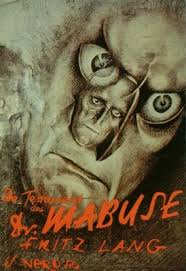
Hofmeister (Karl Meixner) is a disgraced police detective. Trying to redeem himself he escapes from a criminal element and tries to contact his former boss Commissaire Karl Lohmann (Otto Wernicke). Before he can tell Lohmann what he knows about a criminal conspiracy, a band of henchmen catch up with him. He escapes but the horror of what he has been through affects his mind. He is put in an asylum that is run by Professor Baum (Oscar Beregi Sr.).
Also in the same institution is Dr. Mabuse (Rudolf Klein-Rogge). Mabuse is a master criminal and a hypnotist who went insane ten years ago. Mabuse spends his days furiously scribbling what the doctor believes is gibberish. Baum’s colleague Dr. Kramm (Theodor Loos) sees the scribbled pages and notes that the scribbling are really detailed instructions on crimes that have recently happened. Kramm intends on reporting this information to the police but is shot.
Lohmann finds out where Hofmeister was when he tried to call for help. He finds scratches on a window at the scene. Believing the scratches are a clue he has the glass taken to the police lab to be deciphered. The lab determines that the word in the glass is Mabuse. Lohmann goes to the asylum but finds out from Dr. Baum that Mabuse died. From the way Baum talks about the dead man Lohmann gets the impression that he was in awe of the criminal and speaks of him as being a genius whose mission was to destroy what he believed was a corrupt world. Dr. Baum’s obsession with Mabuse takes a dark turn.
In the meantime, Lohmann is going through the paces checking leads and following up on crimes that are being attributed to this new criminal boss and putting together a case bit by bit.
Thomas Kent (Gustav Diesel) is a former con who wants to go straight but is unable to shake his past. He has fallen in love with a woman named Lilli (Wera Liessem) who wants to help him. Tom finally confesses to her that he has been working with a counterfeiting ring that is part of a bigger criminal enterprise. The group plans on destroying crops, setting fire to chemical plants, poisoning water supplied and flooding the market with counterfeit money.
Lilli convinces Tom that he needs to report what he knows to the police. Before they can they are picked up by members of the gang and brought to the boss. The boss is a mysterious person that no one has seen. He is a voice that hides behind a curtain. He tells Tom and Lilli that they will never leave that room.
“The Testament of Dr. Mabuse” AKA “Das Testament des Dr. Mabuse” AKA “The Last Will of Dr. Mabuse” was released in 1933 and was directed by Fritz Lang. It is a German crime thriller with horror aspects. It is a sequel to Lang’s silent film “Dr. Mabuse the Gambler” 1922.
The movie was banned by the Nazi Party in 1933. Propaganda Minister Joseph Goebbels believed that it was subversive and it might incite people to anti-social behavior. He also believed it was an instruction manual telling subversives how to perform terrorist acts against the state. Lang also added dialogue as ravings coming from a mad man that was similar to the ideas the Nazi’s expounded. The world premiere of the film was held in Budapest, Hungary instead. The film was banned in German until 1951 and even then, it was shown in an edited version.
The movie is downright creepy in spots. My favorite character is the detective Lohmann. He's smart tenacious and rough around the edges. The scenes where Professor Baum is in conversation with a ghostly Dr. Mabuse are a little disturbing. The entire film was really good. It’s a fascinating blend of mystery and horror. The direction was great. Some of the shots were even artistic. The plot was absorbing. It was a fast two hours of cinema.
The film was shot in both German and French, similarly to how “Dracula” 1931 was filmed in both English and Spanish. The French version was called "Le Testament du Docteur Mabuse". The same sets were used but different actors who could speak French were cast.
A shortened version was dubbed into English and marketed at “The Crimes of Dr. Mabuse”.

